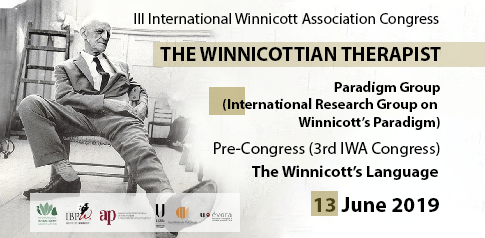Paradigm Group – (International Research Group on Winnicott’s Paradigm)
PRE CONGRESS
3rd IWA Congress: The Winnicottian Therapist
Paradigm Group-International Research Group on Winnicott’s Paradigm
The Winnicott’s Language
CONFERENCES |
Chenxi Wei (Kevin)
Psychotherapist (Winnicottian theoretical and clinical approach)Translator of psychotherapist’s training programs. Registered psychologist of Chinese Psychological Society (CPS)Secretary of Beijing Winnicott Study and Research GroupMaster student in Philosophy of Psychoanalysis at Universidade Estadual de Campinas (UNICAMP). Affiliated student of IBPW.Member of IWATranslator of Winnicott’s books’ and related works’ translation into Chinese- Translator of The Child, the Family, and the Outside World, D.W.Winnicott.- Co-translator of The Maturational Processes and the Facilitating Environment, D.W.Winnicott, and Winnicott’s Theory of Maturational Processes, Elsa Oliveira Dias.
Winnicott’s Language in the Chinese Context | Linguagem de Winnicott no contexto chinês
As more and more study groups and training programs of Winnicottian theory and clinical practice have been established in China, a very practical issue arises: how to translate Winnicott’s language into Chinese? According to Kuhn’s notion of paradigm, the translation from Winnicott’s english – theoretical terms and common words – to mandarin will nevertheless encounter the local incommensurability. This tentative presentation will try to illustrate with examples how Winnicott’s language of his maturational theory, of his psychoanalytic terms, and of his common words are translated into mandarin. Thus it may draw attention that it may not be translation, but interpretation, which requires the translator’s comprehensive understanding of Winnicottian paradigm to conduct a better work.
Elsa Oliveira Dias: O vocabulário do novo paradigma | The vocabulary of the new paradigm
Psychoanalyst. Master of Arts in Philosophy at Pontifical Catholic University of São Paulo (PUCSP). Ph.D. in Clinical Psychology at PUCSP, with thesis: The Theory of Psychosis in D.W. Winnicott. Founder, together with Zeljko Loparic, of Brazilian Society of Winnicottian Psychoanalysis (SBPW, 2005). Vice-chairman of the International Winnicottian Psychoanalysis (IWA, 2014). Author of the books Winnicott’s Theory of The Maturational Processes (2016) by Karnac Books; Sobre a Confiabilidade e Outros Estudos (2011) (On Reliability and other studies) and Interpretação e Manejo na Clínica Winnicottiana (2014) (Interpretation and Management in Winnicottian Clinic), both by DWW Editorial.
Irene Borges Duarte
Professora associada na Universidade de Évora (desde 1996), depois de vários anos de investigadora e docente na Universidade Complutense de Madrid. Formação em Filosofia nas Universidades de Lisboa (Licenciatura, 1974; Mestrado, 1988) e de Madrid (Doutoramento, Universidade Complutense, 1994), com especialização em Fenomenologia nas Universidades de Freiburg im Breisgau e Mainz. Diretora do Curso de Doutoramento em Filosofia (UÉ, 2011-2017). Presidente da Associação Portuguesa de Filosofia Fenomenológica (2011-2018). Membro da Associação Portuguesa de Psicanálise e Psicoterapia Psicanalítica, da Sociedad Iberoamericana de Estudios Heideggerianos, e do Grupo de Investigação Paradigma Winnicottiano. Pertence ao Advisory Board da revista Heidegger-Studies (Berlim).
O gesto espontâneo e o terapeuta: a linguagem da autenticidade | Spontaneous movement and the therapist: a language of authenticity
Uma das inovações que Winnicott introduz na metodologia clínica é a sua especial valorização e aproveitamento do «gesto espontâneo» infantil no contexto terapêutico. A consideração do gesto, tradicionalmente despreciado na perspectiva da racionalidade e, por isso, tão tardiamente tido em conta pelo pensamento, marca, decerto, uma viragem na definição do ser humano. O esforço de Winnicott, por um lado, e da fenomenologia, por outro, contribuiu de forma fundamental para uma melhor compreensão do longo trajecto vital na sua realização existencial. O presente trabalho procura caracterizar esse esforço e defender que a autenticidade do gesto na espontaneidade do rabisco infantil é necessariamente correlativa da mesma espontaneidade do terapeuta, enquanto abertura acolhedora e não interpretativa, e que ambas na sua correlação configuram o que poderia ser o «ser-o-aí» humano no sentido mais propriamente heideggeriano.
Leticia Minhot
Leticia Minhot holds a degree in Philosophy from the Universidad Nacional de Córdoba -UNC, Argentina- and PhD in Philosophy from the University of Campinas -UNICAMP, Brazil-. She is Professor in the Universidad Nacional de Córdoba in the Faculties of Psychology and Social Sciences. She is in charge of the Chairs of Epistemological Problems of Psychology and Philosophical Conceptions. Author of the book La Mirada psicoanalítica. She has numerous writings on Winnicott. She has focused on the study of the Winnicottian disciplinary matrix.
Spinoza, the ethics of Lacanian psychoanalysis and the ethics of care
As Žižek maintains, a mandate from the current academy, from France to the United States, is to love Spinoza. All declare themselves Spinozists: the Althusserians, the Deleuzians, the feminists, many anti-Hegelians and, of course, Lacan and many Lacanians. Spinoza, in the seventeenth century, considers that the essence of man is desire. Lacan, in the twentieth, seeks to reunite Ethics with the conception of Freudian psychoanalysis about desire. In this work, we seek a dialogue between this ethic crossed by the thought of Spinoza and the ethics of care derived from the Winnicottian conception. For Lacan, the psychoanalytic ethic, that is, the horizon through which the analytic experience must go is whether your actions has been carried out in accordance with the desire. The Lacanian concept of real incorporates the argumental logic with which Spinoza supports the idea of the perfection of the being. The ethic of care, in opposition, has the basement on the original precariousness of the being. In this opposition, we are going to find bases to reinforce our idea that both authors belong to different paradigms.
Spinoza, a ética da psicanálise lacaniana e a ética do cuidado
Como Žižek sustenta, um mandato da academia atual, da França aos Estados Unidos, é amar Spinoza. Todos se declaram espinosistas: althusserianos, deleuzianos, feministas, muitos anti-hegelianos e, claro, Lacan e muitos lacanianos. Espinosa, no século XVII, considera que a essência do homem é o desejo. Lacan, no século XX, busca reunir a ética com a concepção da psicanálise freudiana sobre o desejo. Neste trabalho buscamos um diálogo entre essa ética atravessada pelo pensamento de Spinoza e a ética do cuidado derivada da concepção winnicottiana. Para Lacan, a ética psicanalítica, isto é, o horizonte através do qual a experiência analítica deve ir, é se nossos atos são realizados de acordo com o desejo. O conceito lacaniano do real incorpora a lógica argumentativa com a qual Spinoza apoia a ideia da perfeição do ser. A ética do cuidado, em oposição, baseia-se na precariedade original do ser. Nesta oposição, vamos encontrar bases para reforçar nossa ideia de que ambos os autores pertencem a diferentes paradigmas.
Loris Notturni
2005: Bachelor in Philosophy (Epistemology and Philosophy of Langage), 2007 : Master in Philosophy (on the problem of illusion in the theoretical part of Kant’s criticism), 2008 Agrégation in Philosophy (Moral and Ethics), 2011, PhD Research Scolarship in São Paulo (SBPW), 2010 – PhD in Philosophical Anthropology (Defence scheduled in 2016), Teaching Fellow in Liège University (“Lectures of Modern Philosophy” – BAC3), Founder of the Groupe d’Etudes Winnicottiennes, in the Université de Liège (Bélgique), IWA Secretary-General.
Teleologia e paradoxo no pensamento clínico de Winnicott
In this talk my aim is at underlining that a teleological approach to life — and more specificaly to humain life — underlies the epistemological consistency of the maturational process theory. In this respect I will point out the role of paradox in the formulation of clinical problems in Winnicott’s clinical work.
Teleologia e paradoxo no pensamento clínico de Winnicott
Nesta palestra, o meu objectivo é sublinhar que uma abordagem teleológica da vida – e mais especificamente da vida humana – está subjacente à consistência epistemológica da teoria do amadurecimento de Winnicott. A este respeito, eu salientarei o papel do paradoxo na formulação de problemas clínicos no trabalho clínico de Winnicott.
Ofra Eshel | Winnicott’s clinical revision: Care-cure, working within the realm of needs, and creating new experiences
Ofra Eshel, Psy.D., is faculty, training and supervising analyst of the Israel Psychoanalytic Society, and a member of the International Psychoanalytical Association (IPA); co-founder and former coordinator of the Program of Psy-choanalytic Psychotherapy for Advanced Psychotherapists at the Israel Psy-choanalytic Institute, and of the Israel Winnicott Center, and on the Advisory Board of the International Winnicott Association (IWA); founder and head of the post-graduate track “Independent Psychoanalysis: Radical Break-throughs” (2016) at the advanced studies of the Program of Psychotherapy, Sackler Faculty of Medicine, Tel-Aviv University. She is the book review editor of Sihot-Dialogue, Israel Journal of Psychotherapy. She was the recipient of the Leonard J. Comess Fund grant at the New Center for Psychoanalysis (NCP), Los Angeles, 2011; and awarded the Frances Tustin Memorial Prize for 2013.
Zeljko Loparic
Zeljko Loparic has a PhD in philosophy and since 1984 teaches philosophy and history of psychoanalysis at different universities in Brazil and abroad. In 2005 he founded, together with Elsa Oliveira Dias, the Brazilian Society of Winnicottian Psychoanalysis (SBPW). In 2013 he founded and was elected president of the International Winnicott Association (IWA). In 2014 he started teaching the Sino-Brazilian Training Course in Winnicottian Psychoanalysis in Beijing. In 2015 he promoted the foundation of the Brazilian Institute of Winnicottian Psychoanalysis (IBPW), which in 2017 initiated a full 4-year Training Course in Winnicottian Psychoanalysis for Chinese Candidates. He authored (in Portuguese) Heidegger Defendant (1990), Ethics and Finitude (1995), Heuristic Descartes (1997), Kant’s Transcendental Semantics (2000), On Responsibility (2003), Heidegger (2004), Winnicott and Jung (2014) and (in English) Winnicott´s New Track (2017), co-edited several collective volumes, and published numerous papers in national and international journals on general philosophy of science (Carnap, Kuhn) and philosophy (mainly Kant and Heidegger) and history of psychoanalysis (Winnicott).
Os problemas maturacionais e sua resolução em Winnicott | Maturational problems and their solution in Winnicott
Retomando uma longa tradição na epistemologia, Kuhn caracterizou a ciência empírica normal como atividade de resolução de problemas e comparou esses problemas a quebra-cabeças. Numa parte inicial do presente trabalho, mostrarei que essa concepção pode ser aplicada à atividade de resolução de problemas clínicos tal como concebida e desenvolvida por Freud. O meu principal objetivo é mostrar que a mesma concepção não se aplica à clínica de Winnicott e que essa diferença é mais um ingrediente da mudança paradigmática operada por Winnicott na psicanálise tradicional.

